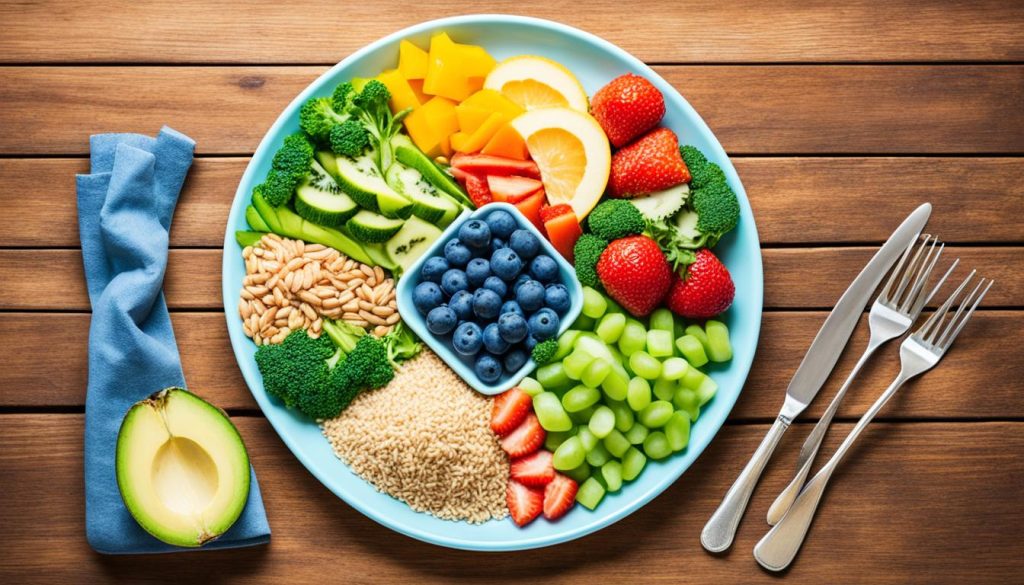Have you ever felt stuck in a cycle of yo-yo dieting, searching for a lasting way to lose weight? I’ve been there, and I understand the frustration. But what if I told you there’s a better way? A path that not only helps you lose weight but also takes care of your body and mind?
Welcome to sustainable weight loss, where healthy habits and body positivity meet. This isn’t about quick fixes or extreme diets. It’s about living a lifestyle that makes you feel great inside and out.
Losing 1-2 pounds a week is best for your health. This slow pace is good for your mind and helps you succeed over time. It’s not about the weight you lose; it’s about how you feel in your own skin.
Imagine starting each day with more energy, confidence, and joy. That’s what sustainable weight loss can do for you. By eating well, exercising regularly, and taking care of yourself, you’re not just changing your body. You’re changing your life.
Are you ready to start your journey? Let’s see how you can feel better, look better, and love the skin you’re in. Remember, it’s all about progress, not perfection. Every small step is important on the way to a healthier, happier you.
Understanding Sustainable Weight Loss
Sustainable weight loss is about making slow, steady changes for the long haul, not quick fixes. It mixes eating right and moving more to burn calories. This leads to steady weight loss over time. Let’s dive into what makes this approach work.
Defining Sustainable Weight Loss
It’s about losing 0.5 to 2 pounds each week with healthy habits. This method focuses on lasting weight loss, not just losing weight fast. By eating fewer calories than you burn, you can lose weight safely and steadily.
Benefits of Gradual Weight Loss
Slow weight loss has many perks. It keeps your muscles strong, lowers disease risk, and boosts health. Eating lots of fruits, veggies, and lean proteins helps a lot. The CDC says doing 150 minutes of moderate exercise a week also helps.
| Food Group | Daily Recommendation | Benefits |
|---|---|---|
| Fruits | 2 cups | Fiber, vitamins, antioxidants |
| Vegetables | 2.5-4 cups | Nutrients, low calories |
| Lean Proteins | 5-7 ounces | Muscle maintenance, satiety |
Setting Realistic Expectations
It’s key to set goals you can reach. Weight loss isn’t always straight forward. Things like your genes, age, and lifestyle affect how you lose weight. Aim to lose 1-2 pounds a week and build healthy habits. Eat mindfully and get 7-8 hours of sleep to help your weight loss.

Understanding these ideas helps you start a lasting weight loss journey. It’s about getting healthier for the long run.
The Importance of a Balanced Diet
A balanced diet is crucial for losing weight and staying healthy. It means eating foods from different groups to get the nutrients your body needs. This approach helps you lose weight slowly and supports your health.
Many diets focus on balanced eating for weight control and health. The Mediterranean diet is full of fruits, veggies, whole grains, and healthy fats. It can lower the risk of heart disease and diabetes. The DASH diet is great for your heart, with foods high in fiber and potassium. The MIND diet is good for your brain, with lots of leafy greens and berries.

Controlling how much you eat is key in a balanced diet. Try to eat half your plate with veggies, a quarter with lean protein, and a quarter with whole grains. This way, you keep your calorie intake in check and get all the nutrients you need. Remember, losing weight safely means losing 1 to 2 pounds each week.
| Diet Type | Key Components | Health Benefits |
|---|---|---|
| Mediterranean | Fruits, vegetables, whole grains, healthy fats | Lower risk of heart disease, diabetes |
| DASH | Low cholesterol, high fiber, potassium-rich foods | Reduced blood pressure, heart health |
| MIND | Leafy greens, berries, nuts | Improved brain health, dementia prevention |
| Nordic | Fish, apples, pears, whole grains, vegetables | Stroke prevention, weight loss |
Adding these eating habits to your life can help you lose weight and get healthier. The main thing is to find a diet you can stick with for a long time.
Incorporating Regular Exercise into Your Routine
Starting a fitness journey is exciting, but keeping up a workout plan can be tough. Over 40 percent of Americans want to lose weight, making it a common goal. A balanced exercise routine is crucial for losing and keeping off weight.
Cardiovascular Activities for Weight Loss
Cardio exercises help burn calories and improve heart health. Try to do at least 150 minutes of moderate aerobic activity or 75 minutes of vigorous aerobic activity each week. Good choices include walking, jogging, cycling, or swimming.
High-intensity interval training (HIIT) is great for burning calories quickly. It’s perfect for those with busy lives.

Strength Training for Muscle Building
Strength training is key for building muscle and boosting metabolism. Focus on all major muscle groups two to three times a week. You can use bodyweight exercises, resistance bands, or weights.
As you get stronger, increase the weight or resistance to keep challenging your muscles.
Finding Exercises You Enjoy
Finding exercises you like is key to a lasting workout plan. This could be dancing, rock climbing, or team sports. Try different activities to see what motivates you.
The best fitness goals are those tied to activities you enjoy doing often.
By mixing cardio, strength training, and fun activities, you’ll have a balanced routine. This supports your weight loss and overall health. Always talk to a doctor before starting a new exercise plan, especially if you have health concerns.
Feel Better, Look Better: A Guide to Sustainable 10-Pound Weight Loss
Starting a weight loss journey doesn’t have to be hard. With the right steps, losing 10 pounds can make you feel and look better. It’s all about healthy habits and lasting lifestyle changes.
Experts say to lose 1-2 pounds a week for the best results. This slow pace helps you lose fat, not muscle, and keeps the weight off. Focus on eating fewer calories and exercising more to reach this goal.

What you eat is key to losing weight. Eat lots of protein from lean meats, fish, and beans to stay full and keep your muscles strong. Add lots of fiber-rich veggies and whole grains to your meals for more fullness and nutrients.
Drinking 64 ounces of water a day is important. It gives you energy and helps with weight loss. Try eating more slowly and listening to your body’s hunger signals to avoid eating too much.
| Component | Recommendation | Benefit |
|---|---|---|
| Protein intake | Include in every meal | Promotes satiety, preserves muscle mass |
| Fiber | Eat plenty of vegetables and whole grains | Aids digestion, promotes fullness |
| Hydration | 64 ounces of water daily | Boosts energy, supports weight loss |
| Mindful eating | Eat slowly, listen to hunger cues | Prevents overeating, improves digestion |
Remember, losing weight is about making progress, not being perfect. Small, steady changes can add up over time. Stick to your goals, and you’ll start feeling and looking better soon.
Mindful Eating Practices
Mindful eating is a great way to lose weight for good. It means paying attention to what and how you eat. This can change how you see food and boost your health.
Studies show mindful eating works as well as traditional diets for losing weight. In a study, 34 women lost about 4 pounds in 12 weeks. They also felt better about themselves.
To eat mindfully, eat slowly and enjoy each bite. This helps you know when you’re hungry or full. Don’t eat in front of the TV or with your phone. This keeps you focused on your food and stops you from eating out of boredom or stress.
Mindful eating can cut down on emotional eating. It helps stop binge eating by making episodes less frequent and intense. This is especially good for those who eat too much for unhealthy reasons.
Adding mindful eating to your daily life can lead to better eating habits and lasting weight loss. The aim is to have a good relationship with food, not to cut out things you like.
The Role of Sleep in Weight Management
Sleep is key to managing weight. Studies link sleep patterns to body weight. As Americans sleep less, their weight has gone up. This shows a link between poor sleep and more obesity.
How sleep affects weight loss
Not getting enough sleep messes with your body’s natural sleep cycle. This messes with hormones that control how hungry or full you feel. Those sleeping less than 6 hours a night are more likely to be obese. Not sleeping well can also make you eat more.
Tips for improving sleep quality
Good sleep habits are important for managing weight. Make your bedroom dark and quiet. Don’t eat late and try to relax before bed. Aim for 7 hours of good sleep each night. Being an early riser can help you keep the weight off.
Creating a consistent sleep schedule
Sticking to a regular sleep schedule helps your body rest and recover. Go to bed and wake up at the same time every day, even on weekends. This keeps your body clock in check and makes sleep better.
| Sleep Duration | Effect on Weight |
|---|---|
| Less than 6 hours | Higher risk of obesity |
| 7-9 hours | Optimal for weight management |
| More than 9 hours | May lead to weight gain |
Stress Management Techniques for Weight Loss
Chronic stress can stop you from losing weight. It makes you eat more and gain weight. But, there’s good news. Stress reduction techniques can help you on your path to better health.
Meditation is a great way to reduce stress. Just 10 minutes a day can calm your mind and stop emotional eating. Deep breathing exercises are also helpful. Try taking five deep breaths when you feel stressed. This simple act can lower cortisol and stop cravings.
Yoga is perfect for managing stress and losing weight. A 30-minute session can burn calories and improve your mental health. Regular exercise is also important. Aim for 150 minutes of moderate activity each week. This helps with weight loss and boosts your mood too.
Managing stress is not just about losing weight. It’s about improving your overall health. By using these techniques, you’re taking care of your mental health and setting the stage for lasting weight loss. Start with small steps, be consistent, and see how these habits change your life.
Hydration and Its Impact on Weight Loss
Water makes up about 60% of our bodies. It’s key for more than just staying hydrated. It can really help with weight loss too.
Benefits of proper hydration
Drinking enough water boosts your metabolism and helps burn fat. A study showed that drinking two cups of water increased metabolism by 30% in healthy adults. It also makes you feel full, which can lead to eating fewer calories.
People who drank two glasses of water before meals ate 22% less than those who didn’t. This can help with weight loss.
Strategies to increase water intake
Try to drink at least eight 8-ounce glasses of water every day. Drinking water before meals can help control your appetite. Adults who did this lost 44% more weight than those who didn’t.
Keep a water bottle with you and set reminders to drink throughout the day. Sometimes, feeling hungry can be thirst in disguise. So, drink water when you feel hungry.
Hydration alternatives to plain water
If you don’t like plain water, there are other options. Fruits and veggies like cucumbers, watermelon, and oranges can help you stay hydrated. Herbal teas and infused water are also good choices.
Switching sugary drinks for water or these alternatives can cut calories and help with thirst. A 2013 study found that drinking water instead of sugary drinks reduced weight gain by 1.1 pounds over four years.


